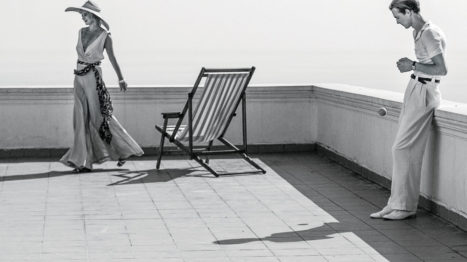
Each month, the Indie Prof reviews a current film in the theater and second film or series available on DVD or instant-streaming service. Follow “Indie Prof” on Facebook for updates about film events and more reviews.
Paradise (2016)

Paradise
This wonderful Russian film was one of the best foreign films a few years ago, but it has been rarely seen in the United States until now. Director Andrey Konchalovskiy (House of Fools, The Postman’s White Nights) is a veteran of over 25 films covering four decades. He started in the early 60s with Russian master Andrei Tarkovsky (Andrei Rublev, Solaris), and he has traveled between Russia and the U.S., making Hollywood films (Tango and Cash, believe it or not!) as well as Russian. Paradise may very well be his best.
The film tells the story of three people during WWII: Olga, a Russian aristocrat and member of the French Resistance; her former lover Helmut who is now a high-ranking SS officer; and Jules, a French policeman working with the Germans during the occupation. Olga is able to use her beauty and charm to her advantage despite the awful circumstances surrounding her, and she has varying levels of success and despair. Their triangle tracks the events of the war over a two-year period. The story, however, may be secondary to the spectacular black and white cinematography of Alexsandr Simonov and the effect it has on rendering the events of the era as both a historical document and a statement on the simple (im)morality of the players and the larger events.
The performances in the film are very good, the narrative and staging are excellent, and besides the cinematography, the editing and music round out the cinematic aspects quite well. It all points to excellent direction—a master at the top of his game working at his craft. It is a thing of beauty to sit and watch, and a rare treat from a country that is so polemical on the world stage that we tend to forget its beautiful art—from both past and present.
Starts Feb. 2 at the Sie Film Center
You will like this if you enjoyed Ida, Son of Saul, and/or Denial.
In the Fade (2017)

Most films about terrorists focus on either the terrorist or the chase for the terrorist. Few films focus on the aftermath of a bombing or the people left behind. Fewer still focus on the females left behind. This wonderful new film from Germany does both: it tells the story of Katja Sekerci (Diane Kruger), a woman whose husband and son were killed in a Hamburg terrorist attack. The film starts out as a somewhat conventional narrative: Katja’s husband and son are killed in the bombing, the police investigate, subjects are found, and there is a trial. The issue is especially thorny since Katja’s husband was a Turkish immigrant and a former convicted drug dealer, and the suspects are white Germans. They are acquitted, and that is where things get interesting.
Director Fatih Akin (Head On, The Edge of Heaven) is a German veteran who provides a steady hand and the cultural background to look at the issues from all sides. He is a German-born citizen from Turkish parents. He grew up in a world between two cultures, and he explores those cultures closely, without prejudice, and with a keen eye for detail. Kruger is a veteran of both German and Hollywood films, and her performance drives and centers the films: she is fierce, complex, and full of surprises. Best known for her role in Inglorious Basterds, she is the emotional and narrative center of the film. When her husband and son are killed, she is always on the edge of spiraling out of control, alternately engaging in the process and then shunning it and everyone around her. She is exquisite.
The film recently won the Golden Globe for Best Motion Picture, Foreign Language. It should be an Oscar contender, and for good reason. I saw it last November at the Denver International Film Festival, and I felt its raw energy, its cultural and political depth, and its timeliness. It handles the cultural aspects of contemporaneous issues particularly well, and it goes beyond the simple “Middle-Eastern baddie” stereotype that is so overdone. It also touches on an all-too-ugly facet of our current society: white supremacists. Overall, this is a well-made film that is difficult to watch at times, but it rewards.
No specific release date for VOD (video on demand) has been set, but it is scheduled for February.
You will like this film if you enjoyed Munich, Supremacy, and/or Welcome to Leith.
Vincent Piturro, Ph.D., is an associate professor of Cinema Studies at Metropolitan State University of Denver. He can be reached at vpiturro@msudenver.edu.




0 Comments